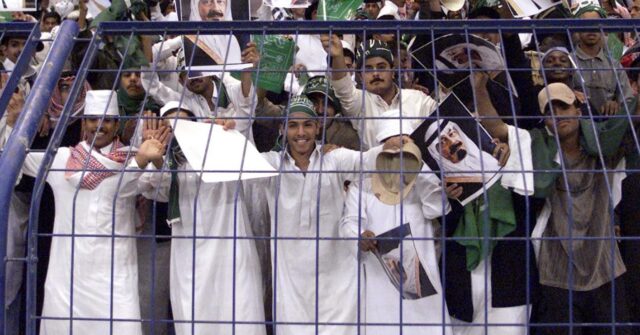VERDICT: False. Saudi officials told the news organizations Reuters and Arab News on Monday that no such edict had come down from the Saudi royal family, no evidence exists that Riyadh would soon announce the legalization of alcohol, and the relevant reports “do not reflect existing policies or regulations.”
Multiple reports online in newspapers and other outlets globally began sharing reports this weekend claiming that Saudi Arabia would soon legalize alcohol consumption. Saudi Arabia’s government is officially Islamist, meaning its law is based on the Islamic sharia, and it is home to the holiest sites in the religion, including the holy city of Mecca, which Muslims are obligated to visit at least once in their lifetimes. Drinking alcohol is haram, or forbidden, in Islam, and most Muslim countries outlaw the presence of alcohol in their territory.
The reports surfacing claimed that Saudi Arabia would legalize sales of alcohol in anticipation of the 2034 FIFA World Cup, the world’s most prestigious soccer tournament. They did not offer sources for their claims. In one example, India’s Economic Times declared categorically: “Saudi Arabia will allow the controlled sale and consumption of alcohol in 2026,” referencing no source for that assertion.
Reuters traced the original report on Monday to a “wine blog,” without elaborating, but added that an anonymous Saudi official told the agency that no such legalization was planned.
“The report about alcohol rules sparked a vigorous online debate in the kingdom, whose king also holds the title of Custodian of the Two Holy Mosques – Islam’s most revered places in Mecca and Medina,” Reuters observed.
Similarly, Arab News reported, citing unnamed Saudi “informed sources,” that the alcohol ban would stay.
“These claims lack any official confirmation from relevant authorities and do not reflect existing policies or regulations in Saudi Arabia,” the “sources” were quoted as saying.
“The sources told Arab News that Saudi Arabia, under its ambitious vision to develop the tourism sector, remains committed to offering a unique and culturally immersive experience,” the report continued. “This approach has been well-received by international visitors who come to explore the Kingdom’s rich heritage and diverse natural landscapes.”
Alcohol consumption is often a staple at sporting events around the world and especially associated with soccer festivities in Western Europe and Latin America. As a result, Saudi officials have fielded questions about allowing drinking during the 2034 World Cup, but have publicly indicated that no such allowance will be given. In an interview in January following the news that the country would host the tournament, Saudi Sports Minister Prince Abdulaziz Bin Turki al-Faisal suggested to television personality Piers Morgan that alcohol bans could allow for a more family-friendly atmosphere at the event.
Asked directly if soccer fans would be allowed to imbibe in Saudi Arabia, the prince replied, “We don’t see it as an issue, honestly.”
“I think some of the fans, they want it [alcohol] … to be part of their experience. (But) I think the stats also reflect in a positive way that, you know, some of the chaos that happens around some fans [who drink at games],” he explained.
“We’ve hosted more than 100 international events … everyone has come and enjoyed it, and it’s become really a family environment,” the sports minister added.
Saudi Arabia won an uncontested bid to host the 2034 edition of the tournament in 2024, outraging many observers, including human rights activists, which deemed the country unworthy of such an honor. Saudi Arabia is the second Arab country to win a bid to host the World Cup after Qatar, which hosted in 2022. Qatari officials initially claimed to approve of alcohol sales but ultimately relented, forcing FIFA to cancel a contract with Budweiser to provide beer and leading to soccer fans chanting a “we want beer!” protest at World Cup games.
Saudi Sports Minister Prince Abdulaziz had cited the Qatari World Cup as evidence that a sporting event could be successful without providing alcohol.
The Qatar World Cup was highly controversial, though not as a result of its alcohol policy. Qatar used a foreign worker system tantamount to slavery to build many of its state-of-the-art athletic facilities, repeatedly denying any worker abuse for years and accusing human rights activists of bigotry for raising the issue. Finally, as the tournament began, the Qatari government admitted to “between 400 and 500” worker deaths in brutal humanitarian conditions while constructing soccer facilities.
At the tournament, fans complained of harassment and intimidation by Qatari officials. In one notable occasion, Qatari security attacked a group of Brazilian fans and trampled the state flag of Pernambuco, confusing it with an LGBTQIA2++ flag. The tournament also documented a mysteriously high number of journalists dying while covering the event, so many that FIFA set up a condolence book in its media center for their peers.
Follow Frances Martel on Facebook and Twitter.
Breitbart News
Read the full article .


